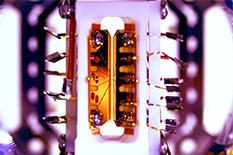IonQ: From Maryland to Wall Street
The University of Maryland (UMD) congratulates IonQ on its announcement today to enter into a merger agreement with dMY Technology Group, Inc. III, and trade on the NYSE as the first publicly traded pure-play hardware and software company in the quantum computing space. IonQ was founded in 2015 by UMD Professor Christopher Monroe and Jungsang Kim, and their systems are based on foundational research at the University of Maryland and Duke University. Monroe is a pioneer in “trapped ion” computing, which uses highly stable atoms as quantum bits, or “qubits” to store information.
"We are proud of our roots at the University of Maryland -- born from an idea in a research lab to the company we are today,” said IonQ President and CEO Peter Chapman. “There is no better place for IonQ to continue to grow and thrive than in College Park. Our connection with the University of Maryland gives us access to a pipeline of stellar workforce talent as we bring quantum computing to scale."
Propelled by a research partnership in quantum science with the National Institute of Standards and Technology (NIST) and the Laboratory for Physical Sciences (LPS) that began more than 10 years ago, UMD is now recognized across the globe as a leader in the quantum field. Today, UMD brings together hundreds of researchers, international collaborators, and government and industry in active partnerships—aided by its strategic location minutes from the nation’s capital.
“The University of Maryland is a hub for the fundamental research in hardware, software and materials that is necessary to make robust, large-scale quantum computing possible,” said Amitabh Varshney, dean of UMD’s College of Computer, Mathematical, and Natural Sciences. “Our ecosystem here at Maryland strongly supports quantum innovation and workforce development. We are proud that research that began in our Department of Physics with a vision from Professor Chris Monroe led to IonQ’s announcement today, and we look forward to the company’s continued success.”
The Quantum Data Center was made possible in part by a $5.5 million investment from the University of Maryland to quicken advancements in research, innovation, and learning, creating economic and social benefits for Maryland and beyond.
In fall 2020, IonQ unveiled its next generation quantum computer system. At the same time, IonQ opened the Quantum Data Center in UMD’s Discovery District to help expedite the development of even more powerful quantum computers for commercial use. The 23,000-square-foot Center houses the company’s state-of-the-art quantum computers. The Quantum Data Center can accommodate 10 quantum computers, with space for more as IonQ's systems simultaneously scale down in size and scale up in number of qubits with each new generation. The space also features 10 conference rooms, Class A office space and two clean rooms for scientific research to enable increased productivity. The combined space can support up to 175 employees, and IonQ has already expanded its team. The company expects to continue aggressively recruiting talent in the years to come.
"The promise of quantum is for smarter, faster computers, new sensors and forms of communication with enhanced security. Quantum computers will lead to safer, longer-lasting batteries for cars and trucks, more effective pharmaceuticals and the ability to perform computing tasks orders of magnitude faster than before. We’re a hub for developing new forms of quantum technology and proud to support IonQ,” Robert Briber, Interim Dean of the A. James Clark School of Engineering, said. “From training today’s quantum engineers to designing entirely new materials with quantum computers, we’re excited to help drive innovation like that of IonQ."
IonQ’s growth contributes to the $2 billion revitalization of the area surrounding UMD, known as Greater College Park, and is a testament to the State of Maryland’s and Prince George’s County’s commitments to supporting the growth and development of innovative, locally-grown companies.
—Thanks to Katie Lawson for the original story on UMD Right Now.
Related Articles: March 8, 2021 Prev Next |


